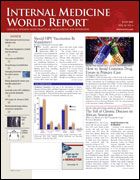Emerging Therapies: Breast Cancer a Preventable Disease?
FROM THE SAN ANTONIO BREAST CANCER SYMPOSIUM
SAN ANTONIO—Breast cancer may become a largely preventable disease with the use of emerging agents, experts suggested at a special session of the San Antonio Breast Cancer Symposium annual meeting.
Leslie Ford, MD, of the National Cancer Institute, described numerous clinical trials showing that tamoxifen (Soltamox) and the selective estrogen receptor modulator (SERM) raloxifene (Evista) are already effective in preventing invasive breast cancer in women who are at high risk for the disease.
Dr Ford noted that for prevention in those at high risk, tamoxifen should be recommended for premenopausal women and raloxifene for postmenopausal women who have not had a hysterectomy; either agent is appropriate for postmenopausal women after a hysterectomy.
Aromatase inhibitors are emerging as the agents of choice for hormonal chemoprevention, as they block 2 carcinogenic pathways in addition to dramatically reducing estrogen levels by inhibiting its synthesis. The current emphasis is on further describing the relative benefits within this class of agents.
The ongoing International Breast Intervention Study II will evaluate the protective effect of anastrozole versus tamoxifen in 10,000 women. The National Cancer Institute of Canada Clinical Trials Group MAP.3 study will compare exemestane (Aromasin), with or without celecoxib (Celebrex), with placebo. And the National Surgical Adjuvant Breast and Bowel Project Study to Evaluate Letrozole and Raloxifene (STELLAR) will compare raloxifene with letrozole (Femara).
"Breast cancer prevention is a reality," said Dr Ford. "The effect [of hormonal chemoprevention] is comparable to widely accepted cardiovascular prevention strategies."
Carol Fabian, MD, of Kansas University Medical Center, Kansas City, noted that the third-generation SERM arzoxifene (Ely Lilly) should be even more effective than current antihormone agents. Arzoxifene, currently in phase 3 trials, consistently reduces tumor cell proliferation in laboratory studies, decreases breast density, and offers a much better side-effect profile than current endocrine agents in humans.
But Powell H. Brown, MD, of Baylor College of Medicine, Houston, pointed out that SERMs reduce the incidence of breast cancer by 32% to 74%, "not 100%," and have not reduced the incidence of estrogen-receptor (ER)-negative breast cancer in any of the prevention trials.
"There is an urgent need to develop more effective agents that will prevent the development of both ER-positive and ER-negative breast cancer," Dr Brown emphasized.
Among these, a viable candidate is celecoxib, which suppresses both ER-positive and ER-negative mammary tumors in mice and is being studied in at least 5 important trials at major cancer centers, using a number of breast tissue and blood response biomarkers.
Tyrosine-kinase inhibitors are also promising. The dual tyrosine-kinase inhibitor lapatinib (Tykerb) blocks downstream signaling pathways and has been shown to prevent ER-negative tumors in mice, he noted.
A very encouraging class of chemoprevention agents is the rexinoids, which target different sites in the oncogenic cascade. For example, bexarotene (Targretin) has been shown to inhibit the growth of breast cancer cells and premalignant breast cells in vitro and to prevent the development of ER-negative mammary tumors by 76% in transgenic mice (bred to develop tumors).
Bexarotene is now entering clinical trials in women at high risk for breast cancer. The experimental retinoid LGD100268 (GlaxoSmithKline) may be even more potent, according to unpublished data, as it reduced the development of tumors by 90% at 1 year (from 100% with vehicle to 10% with bexarotene), prevented premalignant lesions, and inhibited mammary epithelial proliferation in transgenic mice.
Since rexinoids appear synergistic with SERMs, their combination may effectively prevent both ER-negative and ER-positive breast cancer, Dr Brown said.
